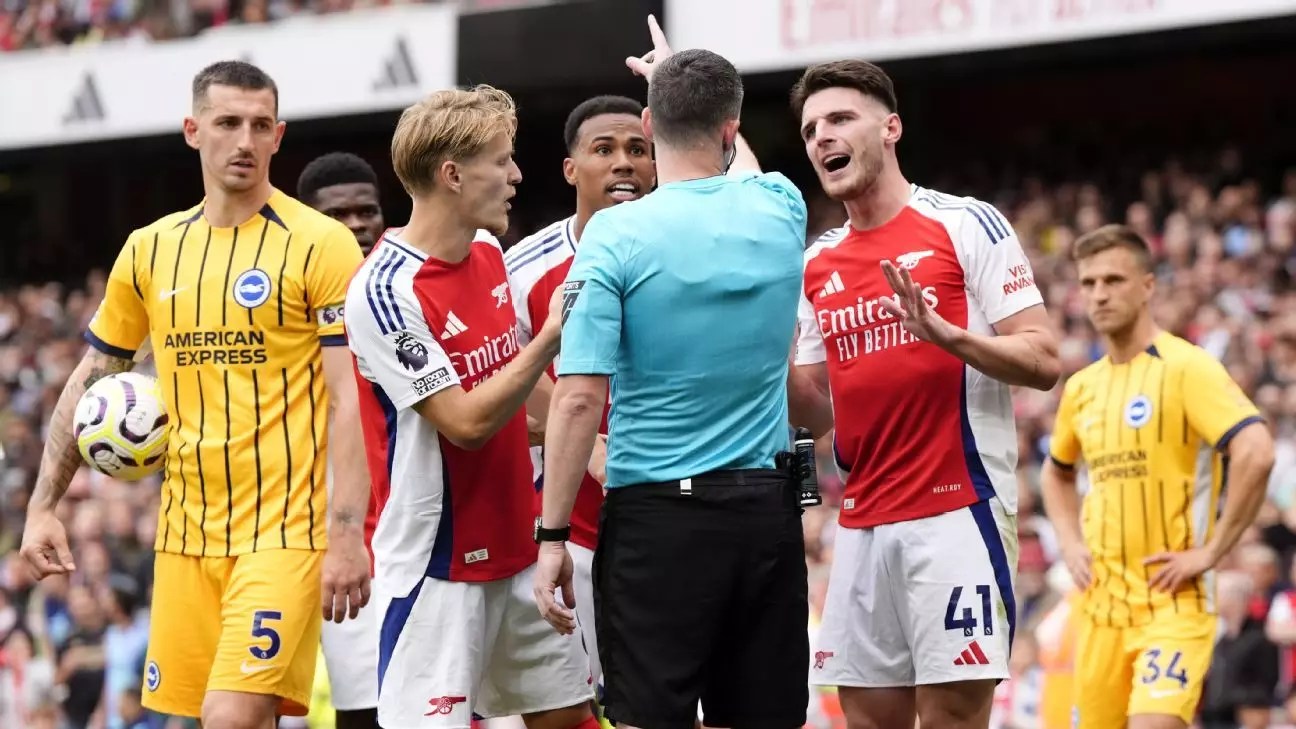The world of football is rife with pivotal moments that can determine the outcome of matches, and officiating plays a crucial role in these high-stakes events. One such incident occurred during a recent Premier League draw between Arsenal and Brighton, where referee Chris Kavanagh faced a challenging decision regarding a red card shown to Arsenal midfielder Declan Rice. This situation has sparked discussions not only about the correctness of the decision itself but also about the broader implications for refereeing standards and player behavior.
In the game against Brighton, Declan Rice was shown a second yellow card for inadvertently kicking the ball away from an opposing player, an act that delayed the restart of the game. The protocol dictates a strict approach toward actions that impede the flow of play, especially when players have already accumulated bookings. Kavanagh’s admission that he “didn’t like” the decision illuminates the emotional weight referees carry while enforcing the rules. The incident reflects not just a singular decision but a longstanding debate on how strict rules should be applied in dynamic match situations.
Despite the defensive rationale Kavanagh provided, the fallout was significant. Arsenal manager Mikel Arteta expressed his disbelief at the dismissal, highlighting the broader complications referees face when making split-second decisions that can affect a team’s performance both on the day and throughout the season.
The Referee’s Perspective
Chris Kavanagh’s internal conflict highlights the human element of refereeing, which often goes unnoticed. Referees are tasked with upholding the rules of the game while also managing the emotional landscape of players, coaches, and spectators alike. The release of the audio from Kavanagh during the incident underlines his unease, as he communicated the necessity of the decision to his assistants while grappling with its implications. This complexity is precisely what the Premier League aims to shed light on with their “Match Officials Mic’d Up” initiative, hoping to foster better understanding among fans regarding the reasoning behind crucial officiating decisions.
Furthermore, Howard Webb, the chief operating officer of the Professional Game Match Officials Limited (PGMOL), supports Kavanagh’s decision by stressing the imperative of holding players accountable for their actions on the pitch. Webb’s remarks suggest a focused campaign to ensure players recognize the importance of respect for the game’s mechanisms, particularly in the context of maintaining fair play.
The incident with Rice has reignited discussions surrounding the overall accountability of referees and the opaque nature of decision-making in football. Although VAR (Video Assistant Referee) was designed to enhance accuracy in officiating, issues still arise regarding human judgment both on the pitch and in the VAR booth. For instance, during the same discussion, an overturned penalty involving Everton’s Dominic Calvert-Lewin showcased a transparent example of the VAR’s role in correcting on-field errors. Webb asserted that misjudgments do occur and need to be addressed, further emphasizing the importance of continual improvement in officiating as part of a broader mandate within the Premier League.
Additionally, the inconsistency in how different players are treated in similar scenarios can lead to frustration among both fans and players. Arteta’s observation that Brighton’s Joao Pedro was not cautioned for a similar infringement highlights a critical point – the application of rules must be uniform to maintain fairness and integrity throughout the match.
As football evolves, so must the processes that govern it. The careful scrutiny of officiating decisions, as demonstrated by the incident involving Declan Rice, encourages a culture of transparency and understanding among the referees, players, and fans alike. This examination not only serves to enhance the credibility of the officials but also raises the standard of play within the league. As the Premier League continues its initiatives to bridge the gap between fans’ perceptions and referees’ realities, it becomes increasingly important to recognize the nuances involved in each decision. The ongoing dialogue surrounding such incidents is essential for the growth of the game and the trust in its officiating body.


Leave a Reply